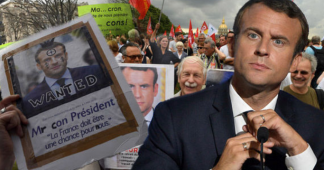by Dimitris Konstantakopoulos
11.12.2018
Published at https://uwidata.com
On the verge of a revolutionary situation France has not witnessed in 50 years, Emmanuel Macron tried to restore peace by making minor concessions, such as raising the minimum wage (the SMIC), improving taxation on pensions and various other minor measures. The SMIC increase will not be covered by corporations, but by diminishing income from Insurance Funds, thus undermining the possibility to keep social salaries salaries at their present levels. Macron of course insists on not taxing the super-rich or putting any additional burden on corporations.
The problem is that the French President is lagging behind reality, the exact way Marie Antoinette had in her time. He makes minor economic concessions when the revolt has already pushed beyond such initial concerns and put broader demands on the agenda – more and more, the state’s entire economic policy is coming into question, along with the political regime itself.
For twenty years, the trade unions have struggled without results. As insufficient as the concessions may seem to the Gilets Jaunes, they do represent the second huge victory in a single month after the suspension of fuel tax increases. They are even more significant when seen in light of Macron’s earlier obstinance in making even the slightest concession, insisting on imposing his “Reforms” in full. These so-called “Reforms”, of course, entailed cannibalizing the public sector and social welfare systems, exactly as they do around the world.
As this article is being written the day after Macron’s announcements, we can not be sure how events will proceed. The initial signs point to a majority of the people rejecting the measures proposed by the President as insufficient, with some ready to push for a general revolutionary uprising regardless of what was announced.
An atmosphere of joy, enthusiasm and happiness is now dominating the blocks of Gilets Jaunes in the French roads, reminiscent of the atmosphere which prevailed during the Revolution of May 1968 (and, to a lesser extent, after Mitterrand’s electoral victory in 1981). Revolutions for societies are, to some extent, what romantic love is for individuals.
On the opposite side, panic dominates the Ministries, the headquarters of France en Marche (Macron’s party) and of the European Commission in Brussels. People in the government are said to be busy collecting their dossiers, including possible compromising materials.
As for the real power behind, the few indications we have pointed to a split between those who back Macron to the point of supporting ferocious repression and those who are pushing him kindly toward the exit.
The temptation to make extensive use of police and even military violence is present, in what could become a repetition of Napoleon III’s dictatorial endeavor.
French police have already made extensive use of unjustified violence, including against pupils. On December 1, they used ten thousand grenades with chemical gas against demonstrators. The same disproportionate violence was used in Brussels by Belgian police.
As Capitalism turns toward the totalitarian, there is a definite tendency to employ authoritarian methods of “governance”, albeit in a selective and isolated way for the time being, and to simultaneously revive McCarthyism in Europe. Some years ago those in power tried to do it by invoking the “terrorist threat” (to a large extent created or at least encouraged by the secret services of US, Western European states, Israel, Turkey and their allies in the Middle East).
Now, of course, the “Islamic-Terrorist threat” has been fast replaced by the “Russian” one. At the same time, unprecedented control of both the media and official “intellectuals” provide expanded possibilities to push the population into conformity, like what happened last Saturday in Paris when France-Info, the most important radio channel in the country, started issuing warnings literally every five minutes that people were coming to Paris “with the intent to kill”!
But there is still a problem with relying solely on weapons. As Napoleon put it, you can do everything with bayonets except sit on them. Even a dictator cannot rule a country when his popularity is at 18%, while some 70% of the population hates him, or at minimum opposes him.
One thing can be said with certainty at this stage: whatever turn events take in the immediate future, the crisis is only beginning. It will develop for a long time and will have many stages, but one thing we can state with confidence off the bat is that nothing will be the same in France, in Europe and in the world, after the latest French revolt.
Governments worldwide are already aware of this fact: The bloody dictatorship of General Sissi in Egypt has expressed its fear by forbidding the sale of yellow vests! We have seen people demonstrating with yellow vests not only in Belgium and the Netherlands but also in Iraq and Burkina Faso!
The country of Voltaire, Descartes and Robespierre has already confirmed, by launching yet another revolutionary movement, its central role in modern Europe. This new French “citizen’s revolution”, is the beginning of a Class War in Europe, inside the center of Western capitalism, the power system which still dominates the world and threatens all of us with social, war and climate holocausts.
This is the beginning of a war of the People against a more and more globalized Financial Oligarchy and its political and social allies in every country. The outcome of this war may have a decisive impact on the future, if not the very survival of humanity.
(PS) As we write this article, we are beginning to hear about a new “terrorist attack” in Strasbourg, France. There is not much information about it, so we cannot yet make any specific comment… but it is worth noting that we have noticed in a number of terrorist attacks in France, in Belgium and in Britain is that the terrorists involved seem to have a very acute understanding of political timing. Most of their attacks, especially the more spectacular ones, coincide with specific and critically important political moments, often in the middle of important electoral campaigns.
We hope not to be accused of promoting conspiracy theories for reminding our readers about the documented historical facts about the use of terrorism by secret service organizations to obtain goals otherwise impossible throughout 20th Century.
Of course, this does not mean that the Strasbourg attack was a provocation… it only means that if somebody wanted to stage a provocation, they could choose no better action than an attack like the one which occurred in Strasbourg.











